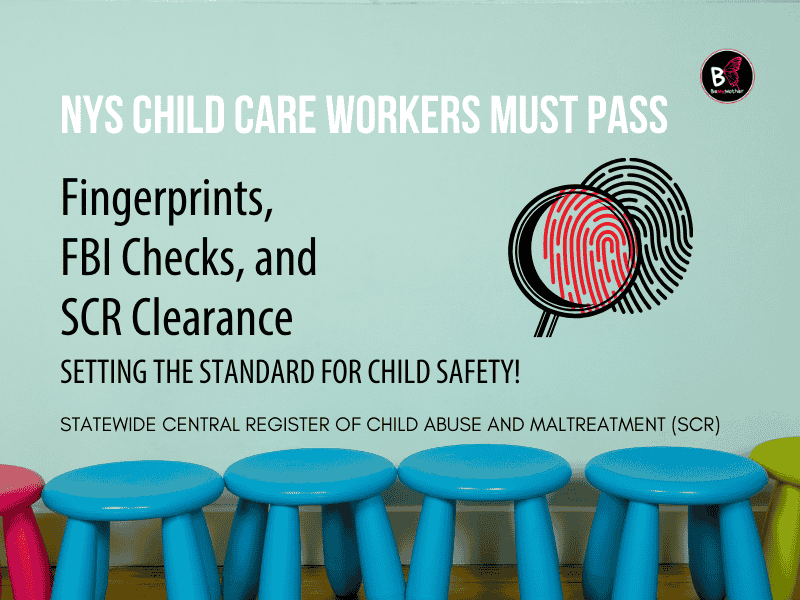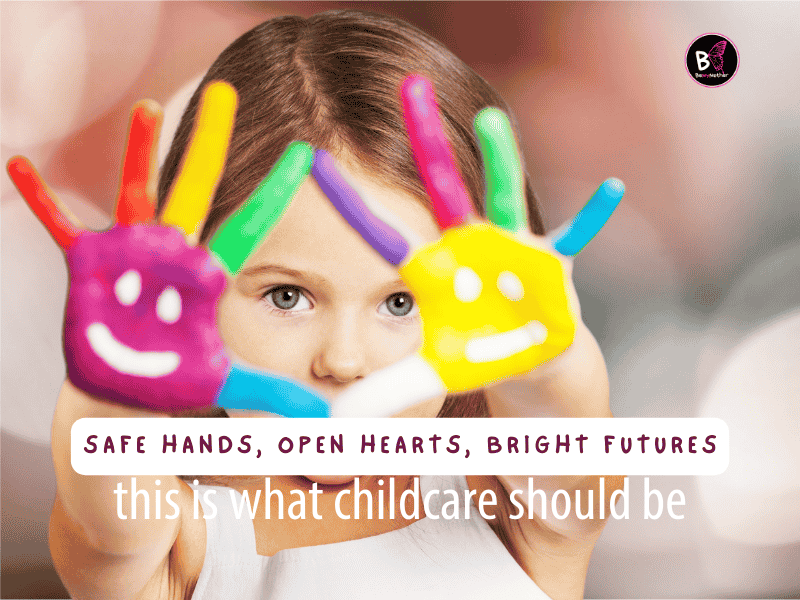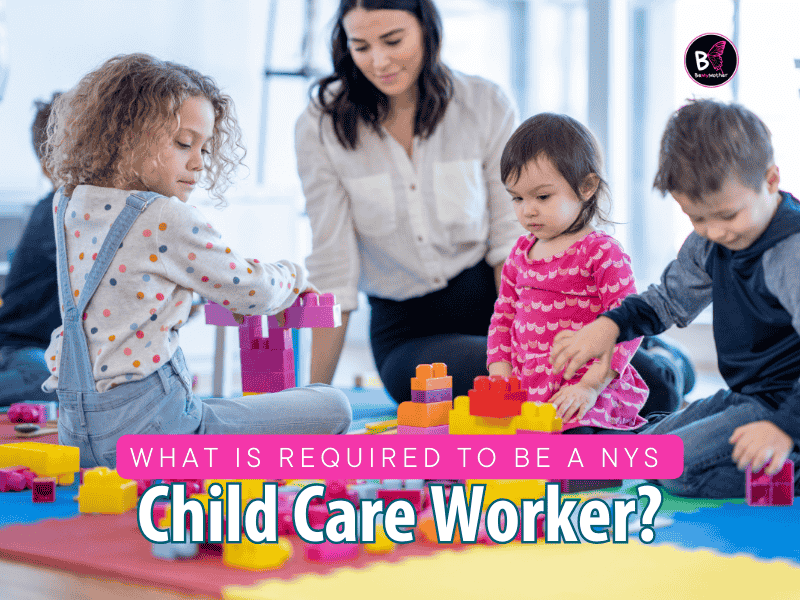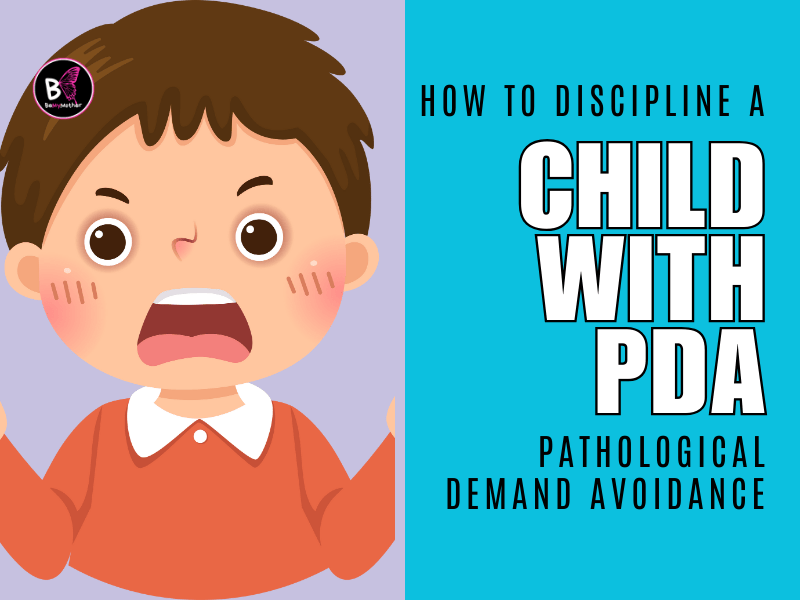Childcare is one of the most rewarding professions, but in New York State (NYS), it’s also one of the most regulated. Parents trust childcare workers with their most precious gift: their children. This is why NYS has stringent requirements for anyone aspiring to become a childcare provider.
If you’re asking, “What is required to be a NYS child care worker?” you are in the right place. This guide will break down the qualifications, training, licensing, and ongoing requirements you must meet. Whether you’re exploring a career as a daycare teacher or planning to open your daycare, this comprehensive guide will help you navigate the process step-by-step.
1. What Is Required to Be a NYS Child Care Worker?

To work in child care in NYS, you must meet educational, training, and legal requirements.
Core Requirements:
- A high school diploma or GED equivalent.
- Completion of state-mandated health and safety training.
- Clearance of comprehensive background checks, including fingerprinting.
These requirements ensure that all childcare providers meet a baseline education, competency, and integrity standard.
2. What Qualifications Are Needed to Work at a Daycare in NY?
Daycare centers in NYS require staff to have specific qualifications depending on their role:
| Position | Minimum Requirements |
| Assistant Teacher | High school diploma or GED and child care training. |
| Lead Teacher | Associate’s or Bachelor’s degree in early childhood education or related field. |
| Director | Bachelor’s degree and management experience in child care. |
Additionally, certifications like CPR and First Aid Training are mandatory to handle emergencies effectively.
💡 Related Article: Thinking about opportunities to care for disabled children? Learn how states support parents in What States Pay Parents to Care for Disabled Children? 8 Shocking Unmissable Facts. Understand your options for making a meaningful impact.
3. Licensing and Registration for NYS Child Care Workers
NYS has two main types of childcare providers: licensed and registered.
- Licensed Providers: Required for group childcare settings and daycare centers.
- Registered Providers: Typically, in-home daycare providers or small-scale caregivers.
Both categories must meet similar safety and training standards, but licensing often involves stricter facility inspections and higher fees.
4. NYS Training Requirements for Child Care Workers
New York mandates specific training for child care workers to ensure they are prepared to handle various scenarios.
Key Topics:
- Health and safety practices.
- Emergency preparedness and response.
- Child development fundamentals.
Training can be accessed through state-approved programs, such as those offered by the New York State Office of Children and Family Services (OCFS).
💡 Related Article: Curious about healthy and safe options for soothing teething babies in your care? Learn more in Is Celery Good for Teething Babies? 7 Surprising Facts Parents Should Know. Get tips to provide the best care for little ones.
5. Mandated Reporter Training: Why It’s Essential

Mandated reporter training is a legal requirement for all childcare workers in NYS.
What It Covers:
- Recognizing signs of child abuse or neglect.
- Understanding reporting procedures to Child Protective Services (CPS).
This training reinforces the responsibility of childcare providers as advocates for children’s safety.
6. In-Home Daycare Requirements in NY
Starting an in-home daycare in NY comes with its own set of requirements:
- Adequate space for childcare activities.
- Passing facility inspections for health and safety compliance.
- Completing the registration process with the OCFS.
You’ll also need to meet zoning requirements and ensure that your home environment supports childcare activities, such as having separate sleeping and play areas.
7. How Many Kids Can You Babysit Without a License in NY?
In New York, you can care for two children (besides your own) without needing a license. Depending on the setup, you must register or become licensed for more than two children.
This regulation emphasizes that even small-scale caregivers are held to safety and competency standards.
8. Steps to Becoming a Daycare Teacher in NY

Becoming a daycare teacher in NYS involves several steps:
- Complete Relevant Education: Earn an associate or bachelor’s degree in early childhood education.
- Gain Experience: Work as an assistant teacher or volunteer in child care.
- Obtain Certifications: Complete CPR, First Aid, and mandated training.
- Pass Background Checks: Meet the requirements for fingerprinting and criminal history clearance.
9. How Long Does It Take to Become a Registered Child Care Worker in NY?
The timeline for becoming a daycare teacher in NY depends on the level of education required for the role:
- Entry-Level Positions: Can start within 6 months to 1 year with a Child Development Associate (CDA) credential and basic training.
- Lead Teacher Roles: Typically require an Associate’s degree (2 years) or Bachelor’s degree (4 years) in early childhood education.
According to the U.S. Bureau of Labor Statistics, many daycare teacher positions, especially in licensed facilities, prefer candidates with higher education credentials. These programs prepare teachers to create enriching learning environments and ensure compliance with New York State regulations.
10. Financial and Business Considerations for Opening a Daycare in NY
$500,000+ Grant Money To Start Child Care Programs In New York
Opening a daycare requires planning beyond meeting basic requirements.
Key Considerations:
- Start-Up Costs: Licensing fees, facility upgrades, and supplies.
- Finding the Right Location: Ensure the space is compliant with zoning laws.
- Ongoing Costs: Insurance, employee salaries, and regular inspections.
For financial support, NYS offers grants and subsidies for new daycare providers through programs like the Child Care Stabilization Grant.
💡 Related Article: Interested in the financial aspects of caregiving? Explore how foster care programs support caregivers in How Much Do Foster Parents Get Paid Per Child? 8 Essential Facts You Can’t Miss. Discover what to expect when caring for children.
FAQ: Common Questions About Becoming a NYS Child Care Worker
1. What certifications are required to be a childcare worker in NY?
You need CPR and First Aid certifications and mandated health and safety training approved by the OCFS.
2. Can you work in a daycare without experience?
Entry-level roles like assistant teacher positions may not require prior experience but do mandate training and background checks.
3. What’s the difference between licensed and registered child care in NY?
Licensed providers are typically larger facilities with strict inspections, while registered providers usually offer small-scale or in-home care.
4. How often do NYS childcare workers need to renew certifications?
Certifications like CPR and mandated training must be renewed periodically, usually every 1–2 years.
5. How do I become a childcare worker if I don’t have a degree?
You can start in entry-level roles with a high school diploma and work toward advanced certifications or degrees while gaining experience.
Internal Links
- “Curious about behavior management techniques? Explore our article How to Discipline a Child with PDA for Expert Strategies.”
- “Want to learn more about safety in child care? Check out What Backgrounds Do Child Care Providers Use? for essential insights.”
Conclusion
Becoming a childcare worker in New York State requires dedication, training, and a commitment to ensuring children’s safety and well-being. Whether starting as an assistant or aiming to open your daycare, understanding what is required to be a NYS child care worker is the first step toward a rewarding career.
By following state-mandated guidelines, completing required training, and meeting licensing standards, you can make a meaningful difference in the lives of children and their families.
💡 Related Article: Wondering about legal rights and responsibilities involving children’s care? Dive into the details in Can a Parent Demand Drug Testing on a Child in Tennessee? 7 Essential Insights Every Parent Must Uncover. Stay informed about key legal frameworks.



